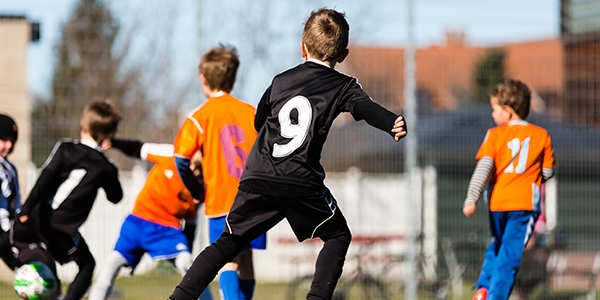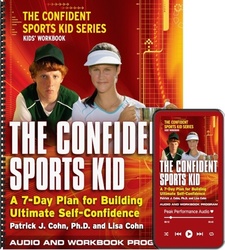
Help Your Athletes Close out Competitions
Summary: Young athletes often struggle to maintain confidence and composure when holding a lead, which can cause them to not play confidently to win. Learning how to close out games is essential for building mental toughness and competitive confidence. Teaching kids to play with an aggressive mindset, focus on their strategy, and practice finishing strong helps them avoid sloppy mistakes that allow opponents to catch up.
Are your sports kids confident in their ability to close out games? Or do they get scared and play sloppily when their team is ahead?
Teach An Aggressive Mindset
Whether your kids play soccer, football, hockey or participate in gymnastics, they need to have an aggressive mindset to close out a competition.
Many athletes become nervous and afraid they’ll melt down even though they have a big lead. These fears of losing and embarrassment can be overwhelming.
For example, a tennis player is up by three games in the final set. She has been aggressive the first two sets, hitting a good number of aces. With a big lead in the last set, she serves cautiously, fearful of double faulting.
Her soft serves allows her opponent to return powerful shots down the line. She ends up allowing her opponent to catch up and take the lead.
Another example: A hockey team has a two-goal lead with five minutes left in the game. Instead of playing aggressively and closing out the game, the team plays defensively.
The defensive style and a few sloppy passes cause the team to give up two easy goals and tie at the end of regulation.
Sloppy play is the result of cautious play. When young athletes play not
to lose, they make mistakes and give their opponents the opportunity to get back in the game.
This is also true of professional athletes.
The Philadelphia Sixers played a game against the Houston Rockets, taking a 96-79 lead into the fourth quarter. Little by little, the Sixers allowed the Rockets to close the gap and the Sixers squeaked by with only a 5-point victory.
Sixers center Joel Embiid addressed the team’s sloppy play heading down the stretch.
“[The Rockets] started making some shots. We had a couple of turnovers, especially me. We had a stretch where at least six possessions in a row we lost possession and they came back down on the other end and started making shots. We have to learn to close games when needed. We relaxed. There’s a lot to learn, but we got the win,” he said.
To Close out the Competition, Kids Need to:
Understand the difference between aggressive and risky play. When they have the lead, they should focus on stretching the lead, not protecting it. They should play aggressively, without taking excessive risks that could lead to sloppy play.
Focus on their game. They may be tempted to focus on their opponent who is making a comeback. They should instead stay focused on their plan and strategy to finish strong.
Pay attention to the process and not the score. When kids focus on the score, they’re focused on the potential outcome of the game. They play not to lose–instead of focusing on the opportunities to maintain or extend the lead.
To boost their ability to finish well, sports kids should practice closing out games. They should create mental scenarios in practice in which they have a lead heading down the stretch.
For example, tennis players should create a mental scenario of being up three sets late in a match. Even when they see opponents making a push to climb back in the match, they should stay focused on each point.
In order to maintain a lead and finish out a game with a win, young athletes should keep the “pedal to the medal.”
They should challenge themselves to get another goal in hockey, have a strong last rotation in gymnastics, or continue to shoot when they are open in basketball.
Closing With Confidence
1. Teach Kids an Aggressive Mindset to Finish Strong
To help young athletes close out games with confidence, encourage them to adopt an aggressive mindset instead of playing cautiously. When kids play “not to lose,” they often make sloppy mistakes. Teaching them to stay aggressive—while avoiding unnecessary risks—helps them maintain control and build confidence in finishing games.
2. Focus on the Game Plan, Not the Opponent
When opponents start making a comeback, athletes can get distracted and lose focus. To close out a competition successfully, kids should concentrate on their own strategy rather than reacting to their opponent’s momentum. Staying focused on their skills and execution ensures consistent performance under pressure.
3. Pay Attention to the Process Instead of the Score
Sports kids often get nervous when looking at the scoreboard, which increases fear of failure. Instead, teach them to focus on the process—such as making smart passes, strong serves, or solid defensive plays. By staying present in each moment, they reduce anxiety and boost their ability to close out games with confidence.
4. Practice Mental Scenarios of Closing Out Games
One of the best ways to prepare kids for high-pressure situations is through mental rehearsal. Encourage athletes to visualize themselves ahead late in a game and practice staying calm and aggressive. This type of mental training builds confidence, resilience, and the ability to finish strong when it matters most.
Related Sports Psychology Articles
- How Toxic Sports Cultures Hurt Kids’ Mental Health
- The Link Between Sports Kids’ Mental Game and Mental Health
- How Youth Sports Coaches Can Build Resilience in Kids
*Subscribe to The Ultimate Sports Parent Podcast
*Subscribe to Peak Performance Sports on Youtube
Download a free sports psychology report to improve your mental game!
The Confident Sports Kid

When kids lack confidence, they doubt themselves, stop taking risks, play tentatively, and are hard on themselves. As a result, kids often lose their motivation to improve. Ultimately, these barriers keep them from enjoying sports and making the most of their physical talent.
“The Confident Sports Kid” program is actually two programs: one that teaches sports parents how to boost their kids’ confidence, and another that teaches young athletes age 8 to 18 how to improve their self talk, avoid negative thinking, overcome expectations that limit confidence, and much more. The program will help kids boost their confidence in sports and life…and enjoy sports more.
FAQ: How Young Athletes Can Learn to Close Out Games with Confidence
Q: Why do young athletes struggle to close out games?
A: Many young athletes struggle to close out games because they become nervous, overly cautious, and focused on not losing rather than playing to win. This mindset often leads to sloppy mistakes that give opponents the chance to catch up.
Q: How can kids develop an aggressive mindset in competition?
A: Teaching kids to play with an aggressive mindset—without taking unnecessary risks—helps them maintain focus and confidence. Instead of protecting the lead, athletes should focus on stretching it by staying proactive and engaged in their game plan.
Q: Why is focusing on the process more important than the score?
A: When young athletes fixate on the score, they begin to worry about the outcome and play more cautiously. By focusing on the process—such as executing strategies, staying sharp, and making smart plays—they perform with greater consistency and confidence.
Q: How can practice help athletes finish games strong?
A: Practice is essential for building mental toughness and confidence in closing out competitions. Coaches and parents can create game-like scenarios in practice where kids imagine themselves holding a lead, allowing them to practice staying calm and focused under pressure.
Q: What role do parents and coaches play in teaching kids to close out games?
A: Parents and coaches play a key role by encouraging kids to maintain confidence, focus on their strengths, and reinforce the importance of staying aggressive. Positive reinforcement and scenario-based practice help athletes learn how to finish games with resilience and consistency.
Play Confidently to Win
Kids Sports Psychology expert Patrick Cohn, Ph.D. has helped athletes for over 35 years to enhance their performance. Dr. Cohn earned a master’s degree in sports psychology from CSUF and a Ph.D. from the University of Virginia, specializing in Applied Sports Psychology. Today, he is the president and founder of Peak Performance Sports, LLC in Orlando, Florida.
